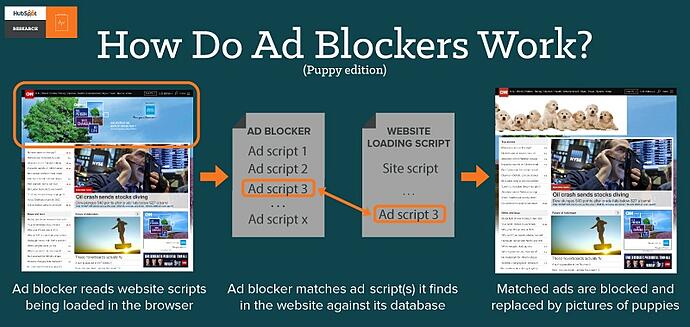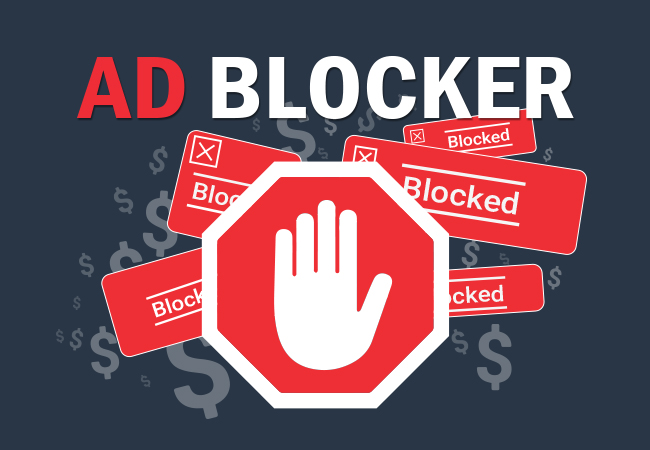Generating content takes time and money, so many websites that offer it for free must rely on advertising to generate revenue. However, many users feel a certain rejection towards this digital advertising, so they consider using ad blockers.
Ad blockers are browser plugins or extensions that work to remove these ads as much as possible. In other words, it blocks banners, pop-ups and any type of native ads that may annoy or hinder user’s navigation. They can also alter the ads so you won’t be able to see the right ad in case it’s sensitive or age-restricted.
As each page loads, ad blockers reviews the website’s scripts against a list of sites that should be blocked. If it finds any, the ad blocker will prevent them from appearing on the web page you are visiting.
Online advertisements can be annoying and detract from your Internet experience. If you’re tired of trying to click on ads every time you search for something on Google or want to enjoy social media, ad blockers could become your best friends.

Since when do Ad Blockers exist?
Surely you think that its origin is quite recent, but the truth is that the appearance of the first blockers began in 2002, becoming much more popular as of 2014.
During its creation to the present, the growth of users of this type of program is estimated at close to 92%. These figures are explained by understanding the growth of our online presence.
Today, most people have access to the Internet and minimal knowledge of the digital environment.
By increasing the number of connected users, digital marketing found a market with great potential, saturating users with intrusive advertisements.
The natural reaction of users was to look for tools to improve their browsing experience and therefore minimize content of this type, blockers of this type being the perfect tool.
In addition, we have to bear in mind that we live in a society of immediacy and no one wants to wait while a Web page saturated with intrusive elements loads.
Ads affect page load speed and an Ad Blockers can help us improve these times and, therefore, the user experience within the site.

Why ads can become a problem?
Although many web pages include advertisements due to the income they generate, they are not as well received by visitors who could become customers. Direct mail is the most irritating for visitors due to the interruption of their online browsing.
We’re sure everyone has had the experience of reading an article, being in the middle of a sentence, and being rudely interrupted by a full-screen ad. We’re not surprised that they’re targeted by ad blockers, but you also have to understand that it’s a good (and most expensive) method of generating revenue.
Below, we will look at some of the reasons why visitors may be deterred from visiting a web page due to the advertisements that are inserted. While an additional stream of income is always welcome, you need to assess whether it’s worth the potential loss of customers and website traffic.

Ads have become an exaggeration of reality
Hype is one of the easiest ways to sell a product. Unfortunately, but true, there are plenty of people who will fall for extreme forms of hype and buy a product because of the false promises an ad offers.
Advertisers want their ad to be remembered and leave the user no choice but to click on it. It’s not enough to just show what the product will do, they need something amazing that the product can do. Does anyone remember when the commercials for Evian mineral water and babies?
Are ad blockers safe?
Some experts share the opinion that if you use open source ad blockers, you can download and analyze it. They do not hide anything and can be audited.
These experts specifically recommend uBlock Origin, an open source browser extension that “blocks absolutely everything.” It is available for Safari, Firefox, Chromium, Chrome, Opera and Edge browsers.
Some browsers, like Google Chrome, have their own ad blocker, which you can activate directly from the browser and works for what they classify as bad advertising practices (ie it doesn’t block all ads).
To configure it, follow the path Settings > Privacy and security > Site settings. Click Additional Content Settings, then click Ads. You can also add an exception to allow ads from a website you trust.
The “anti-adblockers” detect that the advertising of the web page is being silenced and urge you to deactivate your ad blockers
If websites throw these ads at you, it is neither on a whim nor for the love of being a nuisance. It is a way to generate income. Therefore, if a user blocks them, their earnings from advertising are reduced.
This is how the “anti-adblockers” appear as a response: the pages can recognize that the user has an activated ad blocker and launch different strategies to recover the income. How? Surely you have not missed the typical message of “Deactivate your ad blocker on our website to enjoy the content”. Until you disable it, you cannot access the page.
Ad Blockers will mark the future of online advertising
This type of software is leading to a change in the online advertising model, perhaps it is not yet very perceptible but the bases for the future are already outlined.
Ad Blockers aim for a model of ads that are less intrusive and better integrated with the content, what they call acceptable or discreet ads. In addition, this type of advertisement would continue to provide a plus to the content by offering services related to it.
It will be increasingly important to take care of the ads that appear on your pages, to offer your users quality content, even in advertising.







